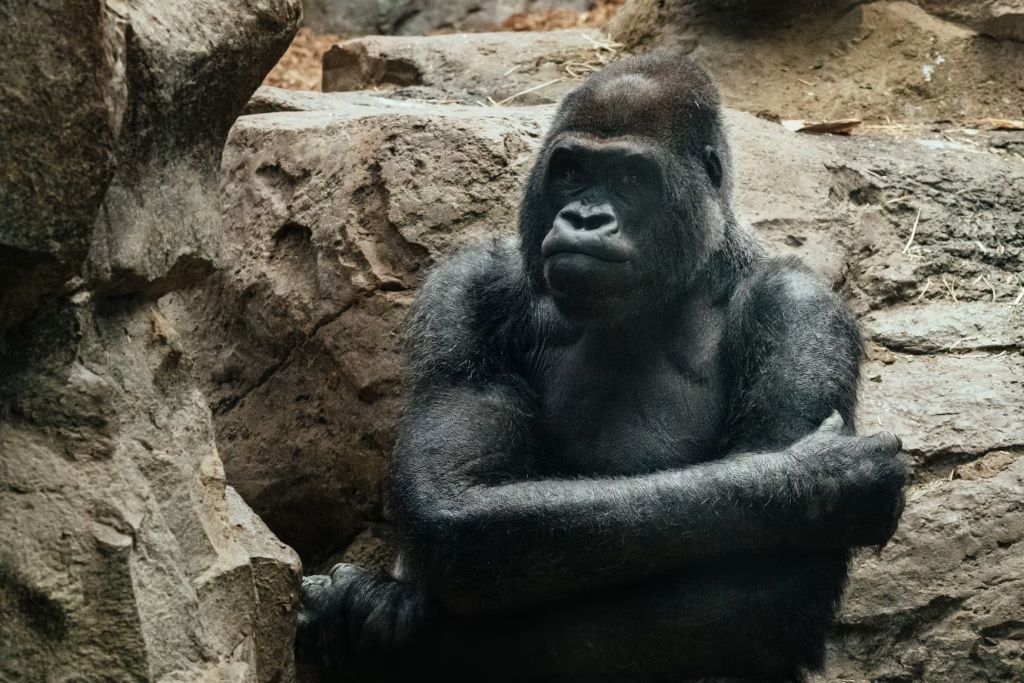
Gorillas are known for their intelligence, strength, and gentle social bonds—but there’s one behavior that often leaves people puzzled: why do gorillas eat their poop? While it might seem odd or even gross at first glance, this action—called coprophagy—is a biologically driven behavior with real functions. From nutrient absorption to gut health, the reasons are both fascinating and practical once you look past the surface.
Let’s walk through what this behavior means, why it happens, and how it fits into the bigger picture of gorilla biology and behavior.
Table of Contents
Why Do Gorillas Eat Their Poop? And What Is Coprophagy
Coprophagy refers to the consumption of feces and is not exclusive to gorillas. In fact, it’s quite common across the animal kingdom, especially among herbivores. Rabbits, elephants, hippos, and even some insects use coprophagy as a way to extract nutrients that weren’t absorbed the first time food passed through their digestive systems.
For gorillas, who survive largely on a fiber-heavy, plant-based diet, the process of digestion isn’t always complete in one round. Their bodies sometimes need a second attempt to fully absorb essential nutrients, especially those created during fermentation in the large intestine. **This helps answer why do gorillas eat their poop because it’s a strategy to recover nutritional value from food that would otherwise go to waste.
Nutritional Reasons Behind Coprophagy
The average gorilla diet is packed with leaves, stems, shoots, and fruit. While healthy, these foods are full of cellulose, a type of fiber that’s extremely tough for mammals to break down. Unlike humans who consume both plant and animal products, gorillas rely entirely on fiber-rich vegetation to fuel their massive bodies.
Digestion in gorillas doesn’t rely solely on their stomachs. Most of the actual nutrient breakdown happens in the colon, where billions of gut bacteria work to ferment plant matter. This process produces short-chain fatty acids, vitamins, and other nutrients that are essential—but here’s the catch: by the time they’re produced in the large intestine, they’re out of reach for effective absorption.
That’s where coprophagy comes in. By re-ingesting their feces, gorillas allow these fermentation by-products a second trip through the digestive system, where the small intestine the primary site for nutrient uptake—can now do its job more effectively.
This form of nutrient recycling is an adaptive advantage that helps gorillas get the most out of a diet that is otherwise low in easily absorbable energy.
Do Gorillas Eat Their Poop for B12?
Yes, and this is one of the most practical biological reasons behind coprophagy in gorillas. Vitamin B12 is an essential nutrient that supports brain function, the nervous system, and the production of red blood cells. Since gorillas eat only plants—and B12 isn’t naturally found in plant sources they face a nutritional gap that needs to be filled another way.
Thankfully, the bacteria in a gorilla’s large intestine produce B12 during the fermentation of plant material. But here’s the challenge: the large intestine isn’t built to absorb this vitamin effectively. Instead, most nutrient absorption happens in the small intestine, which comes earlier in the digestive tract. By re-ingesting their feces, gorillas give their bodies another chance to absorb B12 and other valuable by-products from bacterial fermentation.
This isn’t unique to gorillas rabbits and other herbivores do the same. In fact, it’s a well-adapted nutritional strategy for animals that can’t get essential nutrients from their primary diet alone. For gorillas, this simple act ensures they meet their vitamin needs without relying on animal-based food sources.
Environmental and Behavioral Factors Behind Coprophagy in Gorillas
| Factor | Description |
| Stress in Captivity | Limited space, unnatural routines, and isolation can lead to stress-related behaviors like coprophagy. |
| Lack of Stimulation | Boredom due to low mental and physical engagement may trigger feces-eating as a repetitive habit. |
| Environmental Enrichment | Absence of tools like climbing frames, puzzles, or social activities can increase behavior frequency. |
| Social Learning | Young gorillas may imitate others engaging in coprophagy, especially dominant or older group members. |
| Food Scarcity (Wild) | During dry seasons or low-resource periods, wild gorillas may reuse fecal matter for added nutrition. |
| Habitat Disruption | Environmental stressors like deforestation or relocation can trigger changes in feeding behavior. |
Health Implications of Coprophagy
Like many animal behaviors, coprophagy has both potential benefits and risks. While it may serve important biological functions, it also requires monitoring—especially in controlled environments like zoos. Here’s a closer look at what it means for a gorilla’s health:
Gut Health Benefits
- Eating feces can help restore gut bacteria that are essential for digestion.
- It may stabilize the microbial balance in the intestines, especially after illness or antibiotic use.
- Reintroducing beneficial microbes supports digestive recovery and may improve nutrient absorption.
- Some gorillas have shown faster recovery rates after illness when coprophagy resumes, likely due to microbiome restoration.
Potential Risks
- Feces can contain parasites, bacteria, or pathogens, particularly in enclosed or unsanitary conditions.
- Frequent coprophagy might lead to gastrointestinal issues, especially if the waste material contains harmful organisms.
- It could mask underlying health problems, such as nutritional deficiencies or digestive disorders.
- Zoos and sanctuaries monitor the frequency and context of this behavior as a signal of both physical and mental health.
Wrapping Up
So, why do gorillas eat their poop? The answer is surprisingly practical. Whether it’s to reclaim nutrients, absorb vitamin B12, support gut health, or deal with stress in captivity, this behavior plays a role in their survival and well-being.
Understanding this process gives you a clearer view of gorillas—not as strange creatures with bizarre habits, but as intelligent beings using every tool in their biological toolkit. It’s one more reminder that nature often has reasons we don’t immediately understand—but once we do, it all starts to make sense.
Frequently Asked Questions
Q1. Do all gorillas eat their poop?
No, it’s more common in captivity or under stress, not all gorillas do it.
Q2. Is it harmful?
Not always. It can be helpful, but frequent behavior may need monitoring.
Q3. What nutrients do they get from it?
Mainly Vitamin B12, gut-friendly bacteria, and other missed nutrients.
Q4. Do young gorillas copy this behavior?
Yes, they often imitate adults through observation and social learning.
Q5. Can it help sick gorillas recover?
Yes, it may help restore gut health and support faster healing.
RELATED ARTICLES
Latest Articles
 Jagermeister 750ml Price in India: Full …In Whisky Prices
Jagermeister 750ml Price in India: Full …In Whisky Prices Building a Scalable Payment Infrastructu…In Technology
Building a Scalable Payment Infrastructu…In Technology Tech-Savvy Ways to Streamline Your Finan…In Business
Tech-Savvy Ways to Streamline Your Finan…In Business Magic Moments Vodka Price in India: Size…In General
Magic Moments Vodka Price in India: Size…In General The Role of Claims Agencies in Holding A…In Tips
The Role of Claims Agencies in Holding A…In Tips How Embracing Cloud‑Native Strategies Tr…In Technology
How Embracing Cloud‑Native Strategies Tr…In Technology Poorvika Mobiles Pun: Best Place for You…In Technology
Poorvika Mobiles Pun: Best Place for You…In Technology Why Choosing the Right NEET Coaching Mak…In Education
Why Choosing the Right NEET Coaching Mak…In Education
stopie.com is a participant in the Amazon Services LLC Associates Program, an affiliate advertising program designed to provide a means for sites to earn advertising fees by advertising and linking to Amazon.com.
Clicking on an Amazon link from stopie.com does not increase the cost of any item you purchase.
We will only ever link to Amazon products that we think our visitors may be interested in and appreciate learning more about.





